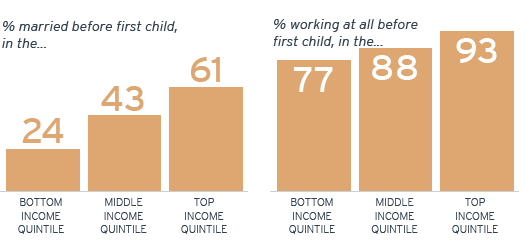A strong start in life
closeParents are the key to a strong start in life. Children born to mothers who have at least a high school diploma are much less likely to fall behind later--but only about half of children in the bottom income quintile have mothers who finished high school with decent grades. Policies that raise high school graduation rates and reduce early and teenage childbearing can help encourage young people to put education before parenthood.
Parents are also children’s earliest and most important teachers: one study estimates that parenting explains about 40 percent of the income-related gaps in cognitive skills at age four. Kids from lower-income homes hear fewer words, read fewer books, and get less stimulation than better-off children. Nobody gets to choose their parents, of course, but parenting skills can be improved through programs like home visiting.
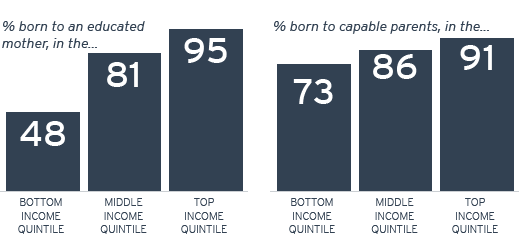
A strong start in school
closeMaking a strong start at school means being ready, both socially and academically. Early math and reading skills best predict later academic performance. It is also increasingly clear that behavioral competencies matter a lot for both cognitive and non-cognitive outcomes. But fewer than half the children born into poverty are school-ready by the age of 5.
Closing the gap in school readiness will require a commitment to stronger preschool programs. Programs that teach both parents and children how to mitigate the effects of childhood stress could help close the gap, too. Researchers are just scratching the surface of the complex relationship between toxic stress and a variety of cognitive and behavioral outcomes. One thing is clear: strong parenting can protect children from the adverse impacts of toxic stress.
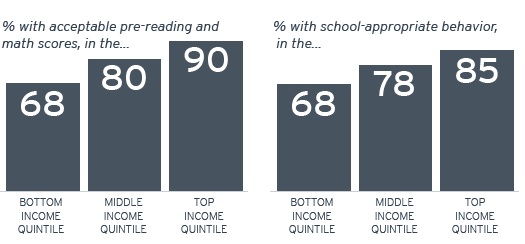
A strong start in college
closeThe first and most basic requirement for a strong start into post-secondary learning is a high school diploma. While graduation rates have steadily risen for the past ten years, low-income students are still almost six times more likely to drop out than high-income students. But a diploma alone isn’t enough: students must leave high school with sufficient skills to succeed at college and in the labor market. This is a huge challenge, especially for low-income students.
So a decent high school degree is vitally necessary: but it is not sufficient. High school does not supply the skills and knowledge required for success in today’s economy. Virtually every field requires some additional training or college. Attending college, even if not for a full four-year degree, results in labor market rewards: each additional year of school means, on average, an extra 10% return in annual income.
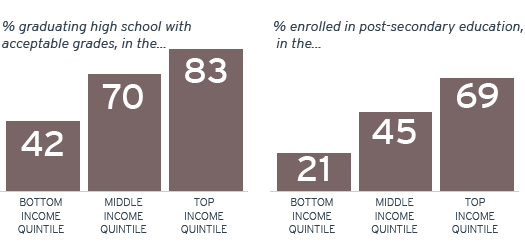
A strong start on the job
closeWhile some college is better than nothing, the biggest returns are associated with earning a degree. Right now, the most common higher education route for lower-income and older students is community college, but more than half of first time enrollees fail to graduate or transfer to a 4-year school within six years. Not only are these students failing to earn a degree, they’re often racking up debt in the process. Pushing on to get the degree is worth it: skilled low-income adolescents who go on to earn a bachelors degree have a 42% higher chance of making it into top two-fifths of the income distribution than those who don’t get a B.A.
In addition to education, a huge barrier to successful labor market entry is criminal conviction. A clean sheet in terms of crime and a college certificate make for a good start in working life: but, again, the gaps between rich and poor are stark.
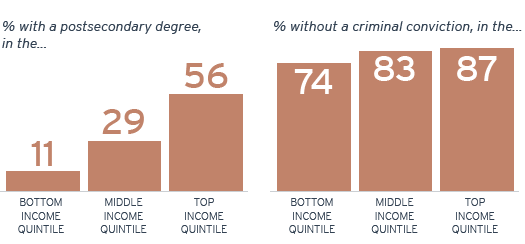
A strong start in the family
closeBefore starting a family, it is best to achieve some financial security and to form a strong relationship: adults should hold down a job and marry before having children. Earning enough to support oneself seems like a good prerequisite for adding dependent children to the household. Creating jobs is a social mobility strategy--as long as all adults are able to secure them.
Marriage matters, too: children born to married parents are much less likely to be in poverty. Starting a family on these firm foundations will improve prospects for all involved, adults and children alike. Critically, however, it also means that the children themselves are more likely to have a strong start in life: and so the cycle turns.
